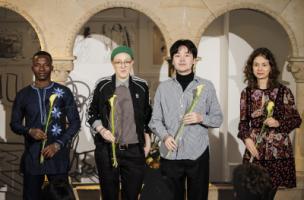
Unter den Sprachen von heute das Flussnetz der Sprachen von einst. (Beneath today’s languages, the river-network of languages from times gone by.)
- Ulrike Draesner, Doggerland (2021)
In the third year of my D.Phil. project, which investigates transnational forms of memory in contemporary French and German literature, I took the opportunity to spend six months as a guest researcher at Friedrich-Schlegel-Graduiertenschule, a graduate school in literary studies within Freie Universität Berlin. In so doing, I became part of a long-standing exchange through which multiple generations of doctoral students have crossed paths between the United Kingdom and Germany. I was especially glad that this plan came to fruition because, like many exchange programmes across the United Kingdom, the partnership faced funding uncertainties and institutional discontinuities after Brexit. I was therefore heartened to learn that my stay would be supported by the Turing Scheme, which has now replaced Erasmus in the UK, and am grateful for the chance to work on the maintaining of the university’s international partnerships amid ongoing challenges. As an international guest student returning to my native country, which I had left to begin my B.A. in Modern Languages at Oxford in 2016 – the very year, coincidentally, of the fateful referendum – I was certainly a rather unusual case. In moving to Berlin, I encountered a mix of the familiar – from the language to the canteen offerings – and the strange, my experiences of the German university system being very limited. My main hopes for the exchange, therefore, were as follows: first, to engage with a new research community, practising my ability to code-switch between different academic cultures, and explore the at times very different methods of enquiry prevalent in German universities. Secondly, to support initiatives upholding the partnership between Freie Universität and my home institution Oxford; and lastly, to make the most of Berlin as a key hub of contemporary European literature and seek encounters with authors and creatives which would make my own research come to life in new ways.
The Friedrich-Schlegel-Graduiertenschule offered ample opportunity for pursuing my first aim. I was thus introduced to the marvellous institution of the graduate colloquium, a format for exchanging work in progress which resembles the graduate seminars held at Oxford, albeit with a few crucial differences: There is one colloquium for each graduate cohort, attendance is mandatory, and each speaker is assigned a fixed, ninety-minute slot in which to discuss drafts or source materials circulated among all participants prior to the session. I found that these sessions were a real gift, enabling a structured, in-depth exchange both with peers and more experienced academics, which was facilitated by the use of pre-readings and by the generous time allocated to each individual presentation and discussion. Called to present my own work in November, I spoke on my third D.Phil. chapter, which compares French- and German-language narrative texts which cut across the period of National Socialism and the Algerian War of Independence. I then developed my presentation into a workshop for the Comparative Literature Department’s yearly convention which, in 2024, explored the theme ‘Literature, Resistance, and Activism’. With a group of undergraduate and graduate students, I discussed extracts from Jérôme Ferrari’s Où j’ai laissé mon âme and Anne Weber’s Annette, ein Heldinnenepos, contrasting Ferrari’s description of a Resistance hero’s transformation into a perpetrator of violence within the French colonial army with Weber’s epic heroine, whose life progresses from the fight against the German Occupation to a renewed activist commitment within the Algerian independence movement.
The theme of contested histories carried over into the AfterWords poetry seminar, which I attended throughout the semester. As an Oxford-Berlin cooperation led by Karen Leeder and Jutta Müller-Tamm, the project offered a great opportunity to bring together people from both institutions. Because my own research focuses largely on longer prose forms, the seminar’s corpus of contemporary lyric poetry also constituted a welcome venture outside my academic comfort zone; yet, in selecting the Franco-German poet Odile Kennel for my contribution to the seminar’s closing conference in February, I was also able to bring my own interests in transnational literature, (self-)translation, and multilingualism to bear on the seminar theme.
My engagement with Kennel’s work was facilitated by Berlin’s wonderfully lively literary scene, and I was able to see her live on stage in January, when she presented her latest anthology, titled Irgendetwas dazwischen at the Brotfabrik cultural centre in Prenzlauer Berg. Throughout my months in Berlin, I attended as many of these readings as fit my calendar, and listened to authors including Cécile Wajsbrot, Emine Özdamar, Durs Grünbein, and Lutz Seiler. A recent event which left a particularly strong impression on me was Ulrike Draesner’s presentation of her book-length poem Doggerland. The work conjures up the language of the prehistoric inhabitants of a land ‘at the confluence of the Rhine and the Thames’ – a territory now covered by the North Sea, separating the British Isles from the European continent. I was moved by the way in which Draesner portrays the humanity of this temporally distant people and imagines the gradual, almost imperceptible shifts in their evolving consciousness. At the same time, the author’s plunge into the deep past entails a reflection on the present and a projection towards possible futures. While the threat of climatic catastrophe faced by the inhabitants of Doggerland felt uncomfortably familiar, their language, which Draesner situates at a halfway point between German and English, seemed to offer a hopeful vision of cultural malleability and inter-linguistic affinity which flies in the face of contemporary forms of nationalist isolationism and constructed notions of cultural homogeneity. Like many of my experiences in Berlin, the encounter with Draesner’s text confirmed my belief in the value of seeking out intellectual paths which cut across established geographic and historical categorisations, nurturing connections with friends and colleagues across disciplines and institutions – and therefore finding new ways of articulating the ever-changing ‘river-networks’ of language and literature.